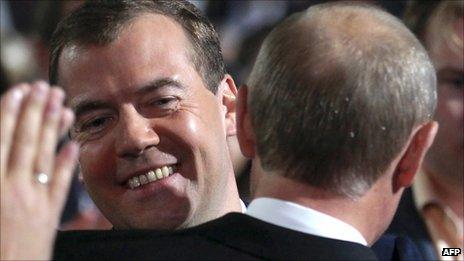Profile: Dmitry Medvedev
- Published

Dmitry Medvedev is very much Vladimir Putin's protege
When Dmitry Medvedev became president of Russia in 2007, he was the country's first leader in decades with no known links either to the former Soviet Communist Party or secret services.
However, Mr Medvedev - a qualified lawyer - is extremely close to his predecessor Vladimir Putin, a former KGB agent.
He campaigned as Mr Putin's protege and tied himself to his policies as soon as he won the 2007 election. "We will be able to preserve the course of President Putin," he said at the time.
With the news that he is to step aside in 2012 and allow Mr Putin to stand again as president, the "course of President Putin" looks set to continue after he leaves the Kremlin.
Indeed, he will not be travelling very far as he is proposing to swap places with Mr Putin, who has served as prime minister while out of presidential office.
Some would argue that even as president, Mr Medvedev left the real decision-making to the man who made him politically.
Rise to prominence
Considered an economic liberal, Mr Medvedev served President Putin as first deputy prime minister, and was also chairman of Russia's enormous state-run gas monopoly, Gazprom.
But his connection to his predecessor began much earlier.
Mr Medvedev trained as a lawyer in Leningrad - now St Petersburg. The son of a professor, he became an assistant professor in his own right at St Petersburg State University in the 1990s.
While there, he became involved in the city council and joined Mr Putin's external affairs team as an expert consultant working for the mayor.
It was a key period in Russia's transition from communism.
In 2000, Mr Medvedev took charge of Mr Putin's presidential election campaign and in October 2003 he was appointed Kremlin chief-of-staff.
Promoted to the post of first deputy prime minister in charge of national projects in 2005, he oversaw major social initiatives in the areas of agriculture, health, education and efforts to boost Russia's low birth rate.
He also helped restructure the Kremlin's relations with powerful billionaire oligarchs who made fortunes in the Yeltsin years, telling the World Economic Forum in Davos in 2007 that the aim was to create "big Russian corporations".
Endorsing his nomination as presidential candidate, Mr Putin said: "I have known him for more than 17 years, I have worked with him very closely all these years".
'Nano-president'
Mr Medvedev has been portrayed by some as a liberal but critics ask if his commitment to democracy is more than mere lip service.
During the 2007 election campaign, he refused to take part in televised debates with other candidates, saying they would give his rivals additional publicity.
But he considers himself a democrat, once saying: "We are well aware that no non-democratic state has ever become truly prosperous for one simple reason: freedom is better than non-freedom."
In office, he has also preached technological innovation for Russia, earning him the unkind nickname "nano-president", a jibe which also refers to his short stature.
Progress, Reuters news agency notes, has been slow on two trademarks of Mr Medvedev's modernisation drive: efforts to create a high-tech innovation incubator at Skolkovo, outside Moscow, and to turn the capital into a global financial centre.
"Dmitry Medvedev did not justify expectations," liberal journalist Mikhail Fishman wrote in a scathing commentary in Vedomosti newspaper.
"There is not the slightest hint that a single one of the tasks he set was implemented. Instead of a reformer we got a seat-warmer."
Perhaps the one change many Russians will remember from his presidency is the renaming of the police force from "militsia" with its Soviet connotations, to the more neutral "politsia".
Whatever his political values, Dmitry Medvedev has Western tastes, being a fan of rock groups like Pink Floyd and Deep Purple, which played at the Kremlin in February 2008 to mark the 15th anniversary of the founding of Gazprom.
Born 14 September 1965 in Leningrad, he was descended, by his own account, from farm workers, a blacksmith and a hat-maker.
He grew up in a small flat in Kupchino on the outskirts of the city now known as St Petersburg, where he says he dreamed of buying jeans.
While still a teenager, he fell in love with his future wife, Svetlana, with whom he has a son.